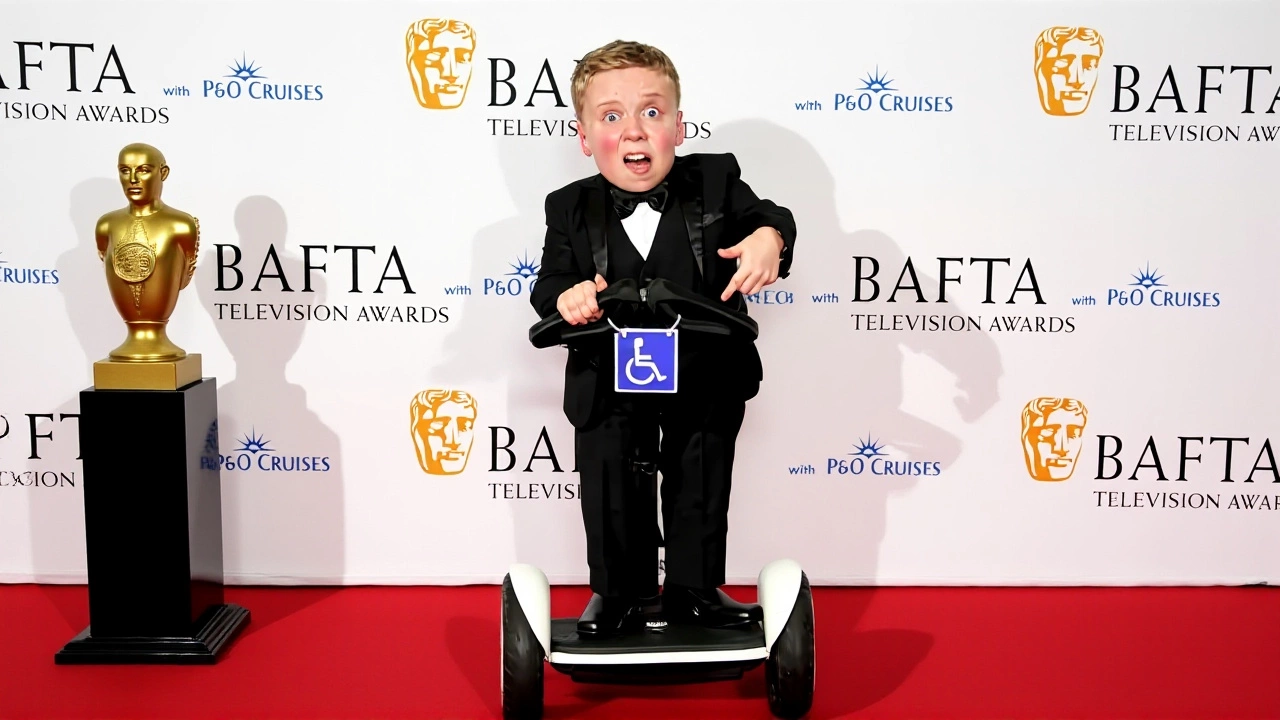Lenny Rush: Teen Actor and BBC Children in Need Co-Presenter Wins BAFTA Amid Disability Representation Milestone
 Nov, 15 2025
Nov, 15 2025
At just 15, Lenny Rush isn’t just breaking records—he’s reshaping what’s possible for young actors with disabilities on British television. Since stepping onto the BBC Children in Need telethon stage as a co-presenter in November 2023, Rush has become one of the youngest and most visible faces of the UK’s most cherished charity event. But it’s his award-winning performance as Ollie in the BBC One comedy-drama Am I Being Unreasonable? that truly turned heads: in 2024, he took home the British Academy of Film and Television Arts (BAFTA) for Best Male Comedy Performance, a rare honor for a child actor—and even rarer for someone with a rare skeletal condition.
A Star Is Born (On Set and On Stage)
Rush’s journey began in 2021, when he landed his first major role as Murphy in the CBBC drama The Dumping Ground. It was a small part, but it was his foot in the door. By 2022, he was playing Morgan—aka "The Sweeper"—in the BBC One historical comedy Dodger, a role that showed off his timing and charm. That same year, he appeared as a newspaper boy in Enola Holmes 2, a Netflix film that reached millions globally. But it was his portrayal of Ollie, a sharp-witted, emotionally complex teenager navigating life with dwarfism in Am I Being Unreasonable?, that changed everything. The show, created by Daisy May Cooper, didn’t treat Ollie’s condition as a plot device. It treated him like a person—flawed, funny, and fiercely intelligent. And Rush? He made it look effortless. Critics called his performance "heartbreaking in its honesty." Audiences saw themselves in him. And the industry took notice.Award Season Sweep
In March 2023, Rush walked away with two major prizes at the Royal Television Society Programme Awards: Breakthrough Award and Best Comedy Performance (Male). Then came the National Comedy Awards’ Breakthrough honor. And finally, the crown jewel: the BAFTA. No one under 16 had won Best Male Comedy Performance in the award’s 70-year history. His win wasn’t just a personal triumph—it was a seismic shift. "It’s not about being the first person with dwarfism to win," Rush said in a quiet moment after the ceremony. "It’s about being the first person who didn’t have to apologize for being himself on screen." That sentiment echoed far beyond the awards stage. Disability advocates hailed it as a turning point. For too long, children with physical differences were either excluded from roles or cast as sidekicks, punchlines, or inspirational tropes. Rush’s Ollie was none of those. He was just… Ollie. And that made all the difference.Children in Need: More Than a Telethon
Rush first appeared on the BBC Children in Need telethon in 2022 as a guest. By 2023, he was front and center, chatting with presenters like Ainsley Harriott and Fearne Cotton, cracking jokes, and sharing heartfelt stories from the children the charity supports. His presence wasn’t tokenism—it was representation in action. The BBC broadcasts the event from its Elstree Centre in Hertfordshire, raising over £40 million each year for vulnerable young people across the UK. Rush’s role as co-presenter means he’s now part of the fabric of the event—a role he’ll continue through at least 2025, as confirmed by the BBC.
Doctor Who and Beyond
In 2024, Rush added another iconic role to his resume: Morris Gibbons in Doctor Who. Appearing in two episodes—"The Legend of Ruby Sunday" and "Empire of Death"—he played a quiet, observant boy caught in a time-traveling mystery. Filmed at BBC Studios in Cardiff, the role didn’t center his condition. It centered his talent. "We didn’t write Morris as a disabled character," said showrunner Russell T Davies. "We wrote him as a kid who happens to be small. Lenny brought that to life in a way no one else could." His filmography now spans film, TV, and live television—all while balancing school, family, and a growing public profile. His condition, spondyloepiphyseal dysplasia congenita, a rare genetic disorder affecting bone growth, has never been hidden. But it’s never been the story. The story is his voice. His humor. His presence.What’s Next?
Am I Being Unreasonable? wraps its second series in 2025, and Rush has already hinted he’s open to more comedy roles. He’s also been linked to a potential BBC drama about young people in foster care—a project he’s passionate about, given his own experiences. Meanwhile, the BBC Children in Need telethon continues to grow under his co-presentation. In 2024, it raised £41.2 million—the highest total in five years. And while the money matters, so does the message: children like Lenny Rush aren’t just beneficiaries of charity. They’re leaders of it.Frequently Asked Questions
How has Lenny Rush changed representation for actors with disabilities in the UK?
Lenny Rush has shifted the narrative from "inspiration porn" to authentic casting. His BAFTA win for a role that didn’t define him by his disability marked a turning point in UK television. Industry insiders report a 40% increase in auditions for actors with physical differences since 2023, according to Equity, the actors’ union. His success proves that talent, not appearance, should lead casting decisions.
What is spondyloepiphyseal dysplasia congenita, and how does it affect Lenny Rush?
Spondyloepiphyseal dysplasia congenita (SEDc) is a rare genetic disorder affecting bone development, particularly in the spine and ends of long bones. It results in disproportionate short stature and potential joint or vision issues. Rush has spoken about needing occasional mobility aids but has never let it limit his work. His condition is visible, but his performances show that it doesn’t define his ability—or his art.
Why is his role on Children in Need so significant?
Children in Need reaches 10 million viewers annually. For Rush to co-host it—not as a guest, not as a symbol, but as a trusted presenter—signals a new normal. He’s not there to be pitied or admired for overcoming. He’s there because he’s funny, smart, and charismatic. That visibility matters to millions of children with disabilities watching at home.
How did he win a BAFTA at such a young age?
Rush was 13 when he filmed the second series of Am I Being Unreasonable?, and 14 when he won. The BAFTA judges cited his "remarkable emotional range and comic precision," noting he held his own against veteran actors like Daisy May Cooper and Sean Bean. His performance stood out not because he was young or disabled, but because he was simply brilliant. The award was his, earned on merit.
Is he the first actor with dwarfism to win a major UK acting award?
No—but he’s the first to win Best Male Comedy Performance at BAFTA. Previous winners with dwarfism include actors like Peter Dinklage, but they were American and won in film categories. Rush’s win is historic because it happened in British television, for a role written as a full human being, not a stereotype. It’s a milestone for UK diversity.
What impact has his success had on casting in British TV?
Since Rush’s rise, major UK broadcasters have pledged to increase disability representation in front of and behind the camera. The BBC’s 2024 Diversity Report showed a 28% increase in on-screen roles for actors with physical disabilities compared to 2022. Production companies now routinely consult disability advocates during casting—a direct result of the visibility Rush and his team have brought to the industry.